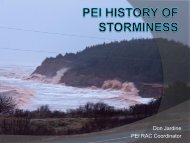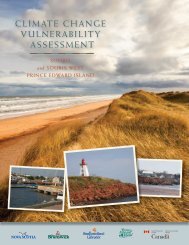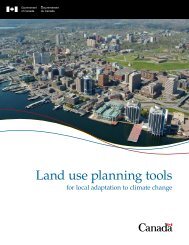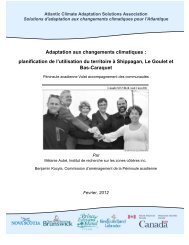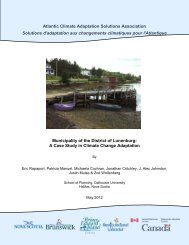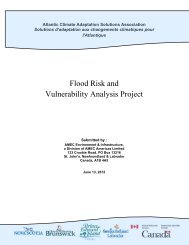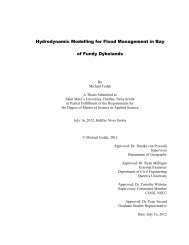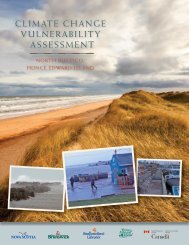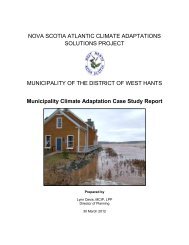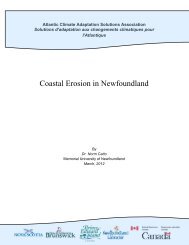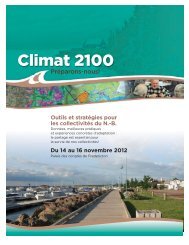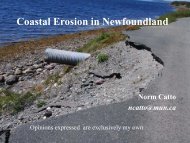Lunenburg Part 2 - Section 5 - Social Vulnerability - August 30.pdf
Lunenburg Part 2 - Section 5 - Social Vulnerability - August 30.pdf
Lunenburg Part 2 - Section 5 - Social Vulnerability - August 30.pdf
You also want an ePaper? Increase the reach of your titles
YUMPU automatically turns print PDFs into web optimized ePapers that Google loves.
A representative of REMO noted that limited time and resources are constraints to emergency<br />
planning in the District – REMO has no full time staff, and no single department or group is<br />
involved in emergency management on a day-to-day basis. Consultees noted that retirees who<br />
had been active in emergency management are not necessarily replaced. However, local<br />
governments are supportive and involved in emergency management; residents frequently<br />
contact their councilor in the case of road access problems due to snow, or long term power<br />
outages.<br />
There is very strong community involvement in the District’s Volunteer Fire Departments; fire<br />
halls are important community gathering-places, and consultees mentioned that most local<br />
people have at least one relative on the fire department. Summer residents are generally much<br />
less involved in emergency management efforts. Consultees unanimously agreed that local fire<br />
departments are very knowledgeable about their communities, and offer excellent service.<br />
Fire departments work to prepare residents for anticipated weather events, such as in Petite<br />
Riviere, where warning fliers are distributed, and the fire hall opened the day prior to an<br />
expected storm. In the event of a severe storm, Fire Halls are opened as comfort stations as<br />
early as 12 hours following the event, although they are only required to provide this service<br />
after 72 hours. Consultees noted that local fire departments have very good knowledge about<br />
areas at risk, those with access problems, and local residents that may require assistance.<br />
Challenges for local fire departments include aging facilities that may experience storm damage;<br />
some may also be located in hazardous locations themselves, such as the Petite Riviere Fire<br />
department, which is located on the Petite River, and requires sandbagging in the event of very<br />
heavy rainfall. Department members also noted that their volunteer status can be limiting: they<br />
lack the authority to close a road due to safety concerns if falling trees or high winds cause<br />
damage to power lines.<br />
Consultees felt that the experience of minor events, such as long power outages, has helped to<br />
prepare residents and emergency managers for the possibility of a more serious situation;<br />
however, other storms that were expected to cause serious damage, but ultimately weakened<br />
before impacting the area, may have generated a false sense of invulnerability amongst some<br />
residents. Some consultees recounted that residents may refuse to evacuate in advance of a<br />
storm, some staying to storm-watch or even swim in the ocean during a hurricane, placing<br />
themselves in avoidable peril.<br />
Community<br />
Consultees described a strong sense of community in the District of <strong>Lunenburg</strong>, challenged by<br />
its being spread over a large area. Councilors are engaged with their communities, and the<br />
current mayor holds a town hall meeting in each district on an annual basis. Communities have<br />
an ethos of ‘looking after their own,’ and consultees felt that neighbours would be aware of<br />
community members who might require assistance, and would provide help to those residents.<br />
In some of its activities, the District of <strong>Lunenburg</strong> adopts a similar approach; the recreation<br />
department has a policy of ‘for the community, by the community,’ and does not build facilities or<br />
infrastructure until the community asks for it. Comfort centres that function during and after storm<br />
events are also community-organized, not operated by REMO.<br />
While these indicators of community involvement are positive signs of healthy communities,<br />
reliance on neighbours to be aware of residents that may require assistance, and on<br />
communities to advocate for their own needs, may neglect the needs of some residents. <strong>Social</strong>ly<br />
vulnerable residents are less likely to feel entitled to community services, and may be unaware<br />
of available channels to advocate for their own needs. Those at risk of being overlooked include<br />
66



